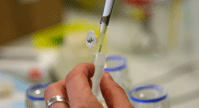Multi-Drug Resistance Gene (MDR1)
Description:
Multi-Drug Resistance Gene (MDR) codes for a protein that is responsible for protecting the brain by transporting potentially harmful chemicals away. In certain breeds, a mutation occurs in the MDR1 gene that causes sensitivity to Ivermectin, Loperamide, and a number of other common drugs. Dogs with this mutation have a defect in the P-glycoprotein that is normally responsible for transporting certain drugs out of the brain. The defective protein inhibits the dog's ability to remove certain drugs from the brain, leading to a buildup of these toxins. As a result of the accumulation of toxins, the dog can show neurological symptoms, such as seizures, ataxia, or even death.
Dogs that are homozygous for the MDR1 gene (meaning that they have two copies of the mutation) will display a sensitivity to Ivermectin and other similiar drugs. These dogs will also always pass one copy of the mutation to all potential offspring. Dogs that are heterozygous (meaning they have only one copy of the mutation) can still react to these drugs at higher doses. Also, there is a 50% chance that a dog with one copy of the mutation will pass it on to any offspring.
There are many different types of drugs that have been reported to cause problems. The following is a list of some of the drugs:
- Ivermectin (found in heartworm medications)
- Loperamide (Imodium over the counter antidiarrheal agent)
- Doxorubicin
- Vincristine
- Vinblastine (anticancer agents)
- Cyclosporin (immunosuppressive agent)
- Digoxin (heart drug)
- Acepromazine (tranquiliser)
- Butorphanol ("Bute" pain control)
The following drugs may also cause problems:
- Ondansetron
- Domperidone
- Paclitaxel
- Mitoxantrone
- Etoposide
- Rifampicin
- Quinidine
- Morphine
Acceptable Sample Types:
Animal Genetics accepts buccal swab, blood, and dewclaw samples for testing. Complimentary sample collection kits are available and can be ordered at test now.
This Test Is Relevant For the Following Breeds:
|
|
|
|
|
|
|
|
|
|
|
|
|
|
Results:
Animal Genetics offers DNA testing for multi-drug resistance gene (MDR1). The genetic test verifies the presence of the recessive MDR1 gene and presents results as one of the following:
| MDR/MDR | Affected | The dog carries two copies of the mutant gene and is homozygous for the MDR1 mutation. The dog will react to Ivermectin, or other listed drugs, and will always pass a copy of the mutated gene to its offspring. |
| MDR/n | Carrier | Both the normal and mutant copies of the gene detected. Dog is a carrier for the MDR1 mutation, and can pass on a copy of the defective gene to its offspring 50% 0f the time. |
| n/n | Clear | Dog tested negative for the MDR gene mutation, and will not pass on the defective gene to its offspring. |
Submit a Sample for Testing:
To submit a sample for testing please go to test now.
To order a sample collection kit please go to order sample collection kits.
Cost per sample is $45.00. Please see our Canine Fee Schedule for all test rates.










